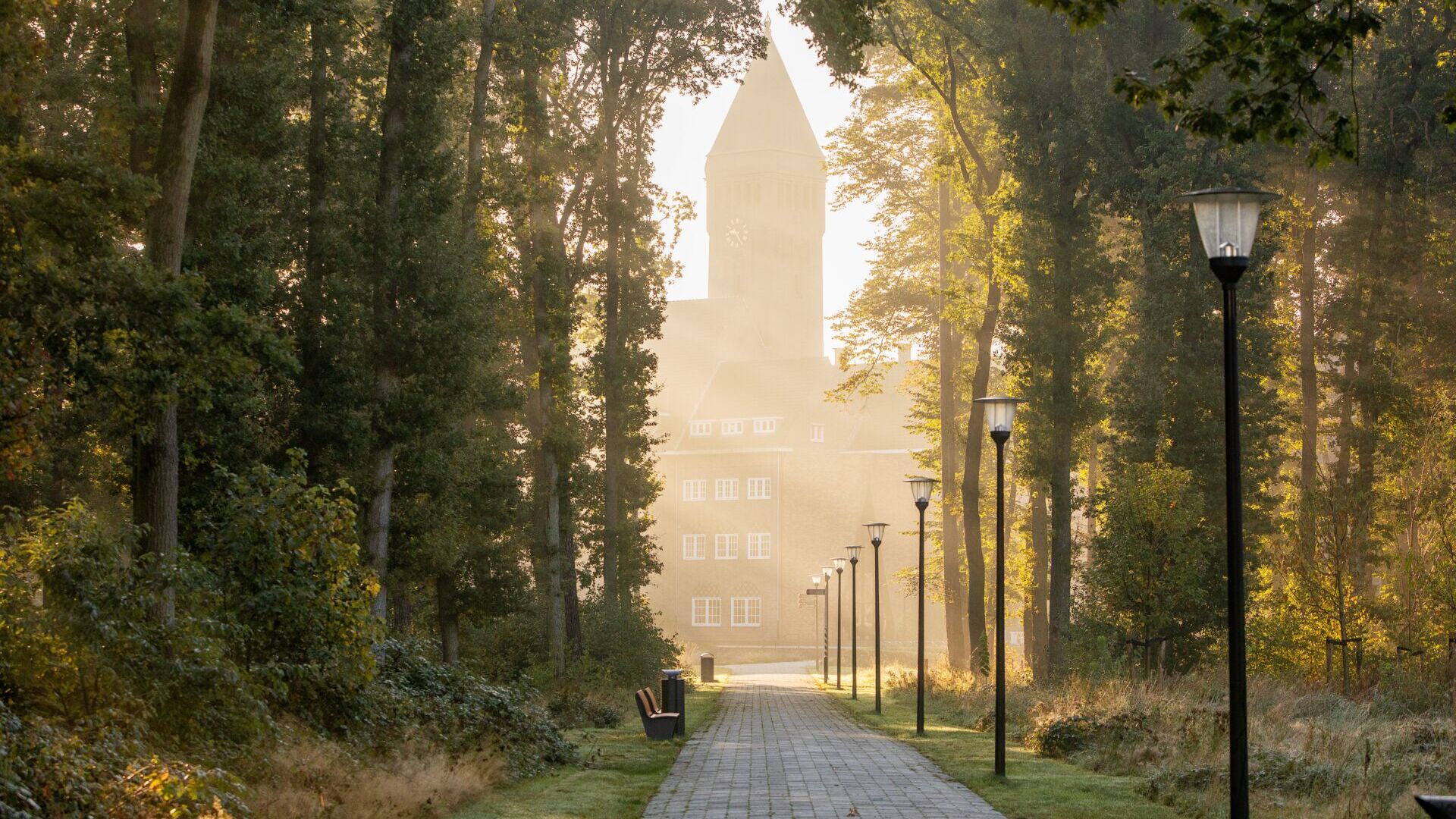Fewer people, less construction: Radboud University has to tighten the belt
-
 Foto: Marjolein van Diejen
Foto: Marjolein van Diejen
For the next few years, Radboud University will feel the effects of lower student numbers, higher costs, and budget cuts by the new government. Presumably, the university will have to contend with fewer staff members, and the planned constructions and renovations have been put on ice. Nevertheless, the Executive Board remains optimistic.
The golden years are over for Radboud University, financially speaking. Because there are lower student number estimates for the next few years, government subsidies for universities have also decreased. Wage costs and inflation rose also steeply over the past year. Radboud University already had to make do with 7 million euros less current academic year, next academic year that will be 11 million euros less.
To top it all off, the new government wants to make massive cutbacks in higher education, up to almost a billion euros per year. Rens Bod, of the action group WOinActie, compared the cuts to the closing of one large university.
Own strength
So not only will Radboud University have to contend with 18 million euros fewer than before, but there will also be government-issued budget cuts. According to Agnes Muskens, speaking in an office in the Berchmanianum building, the exact impact of the new accord for Radboud University is not yet clear. However, it is obvious that Dutch universities will be struck a fierce blow. According to the 2025 policy brief, the university is mindful of budget cuts that can run up to 50 million euros in 2029.
‘Together with other universities, we hope to change the government’s mind’
But the vice chair and the rector magnificus José Sanders emphasize that Radboud University is on solid financial footing right now. ‘And we aim to keep it that way through goal-oriented spending’, Muskens says. Sanders, too, wants to avoid saying the word ‘crisis’. ‘Together with other universities, we hope to change the government’s mind. But we will also rely on our own strength.’
Smarter cooperation
To meet the new budgetary goals, according to the Executive Board, everybody will need to play their part. The 2025 goals have been communicated with the faculties and the various divisions of Radboud Services. In their policy brief, the board advises everyone to be frugal and show restraint when it comes to new obligations, such as hiring staff or other expenses.
It is not yet clear what the impact will be for the next few years. That should become clearer once the budgets of the Outline Agreement – the coalition programme of the PVV, VVD, NSC, and BBB – have been revealed. ‘We hope to have more information after Prinsjesdag’ (September 17th, eds.), as stated by Muskens.
Nijmegen School of Management and HFML-FELIX
It is not yet known what the new budget cuts will mean for the Nijmegen School of Management, according to the board. The school had a budget shortfall of 9 million euros earlier this year, prompting crisis measures to be taken. ‘The School made very good progress in little time’, according to rector José Sanders. ‘Next year’s budgets submitted by the school are in line with the agreements made. We will have to wait and see what the new budget cuts mean for all faculties.’
What is also -as yet- unknown is whether the government’s general agreement will have consequences for HFML-FELIX, the Nijmegen lasers- and magnets lab. Said laboratory briefly had a shortfall of millions of euros. ‘We have been having some good discussions with science financier NWO regarding HFML-FELIX’s financing’, Muskens says. ‘We have high hopes for a structural solution.’
However, this does not mean that the Executive Board hasn’t looked at possible ways to save costs. Education and research should be safeguarded wherever possible. ‘We want to make the professional support of the various faculties cooperate better without sacrificing quality’, according to Muskens. ‘Think of HR, Campus & Facilities, Marketing & Communication, or Finance & Control. We would have done so even without the budget cuts.’
The rector also mentions another possible cost-saver: a different way to organise education. This can be achieved by offering fewer courses or letting the various programmes work together in different ways. ‘We may be able to create nice combinations that will maintain or even improve the quality of education’, as stated by Sanders. ‘We want to look into this with the faculties.’
Fewer people
A likely consequence of the budget cuts is that the university will have to contend with fewer staff. Luckily, a partial solution has already presented itself. ‘If there are fewer incoming students, and that trend will continue for some time, then that also means that in the long term, we will need fewer people for education and research’, Muskens says. According to the chair, support services will also have fewer staff over the years. ‘We cannot give any exact figures as of now; those will depend on government policy, and how successful we can be in changing their minds.’
Understandably, staff are worried for their future, Sanders adds. ‘Just look at the allocated sector plans. The suspected cutbacks are a great cause for concern for people who were hired through those plans. As an organisation, we care about these employees just like we do for all the others.’
The cutbacks may increase work pressure at the university again. ‘That is a serious concern’, Sanders says. ‘We have made hefty investments over the past few years, and now we have a better teacher-student ratio. We will have to find a new form of education without messing with the work pressure.’
Alternative financing
In these dark financial times, Radboud University is also looking for alternative research financing. This includes funding from the second and third sources. ‘When it comes to person-specific grants, our scientists are well above average’, Sanders says. Additionally, the university has pinned its hopes on European subsidies for partnerships and non-scientific organisations, such as post-academic education.
Will the university be able to claim the financial assets of the Reinier Post Foundation? Said foundation was set up after a fundraiser for the founding of the Catholic University Nijmegen, and it was worth 59 million euros in 2023. ‘That money was not intended to fund the government cutbacks’, Muskens says. She points out that the money is meant for the foundation’s goals: to contribute to University or Radboudumc activities that improve the image, identity, or standing of both institutions.
Last fall, the university had intended to loan money from the bank for the new construction on campus. But now that the campus plan is on ice (see insert, eds.) the university is no longer planning to do so in the short term. ‘Fortunately, we are still financially strong; we will not use outside money to finance these cutbacks’, according to Muskens.
Interfaculty initiatives
Both Muskens and Sanders are upset with the new government’s plans for higher education, such as the reversal of sector funds and the possible introduction of a long-term study fine. ‘Huge sums of money were made available in 2022, and this time it’s the exact opposite’, Muskens says. ‘Things get very complicated if the government changes policy so rapidly. That is something we hope to make clear.’ Sanders: ‘The withdrawal of major investment funds or the introduction of a study fine do not contribute to the Dutch knowledge economy and our power of innovation.’
The Universiteiten van Nederland (UNL), a cooperation of Dutch universities, will send strong signals to the government, according to the Board. For example: yesterday, the chairs of the Dutch universities, along with the chair for the UNL, sent a letter to the new minister for education, Eppo Bruins, in which they shared their concerns. The UNL is also considering legal steps against the new government if the education plans go through.
‘Our education and research offer a lot of opportunities’
However, Sanders does not want to just be doom and gloom. ‘In the meantime, we will have to rely on our own strength. Our education and research offer a lot of opportunities. Several years ago, the Executive Board cleared funds for interfaculty initiatives. These resulted in new research cooperations, and we hope to turn those into innovative education where possible. That is something I want to push for, along with the vice deans of education.’
Campus plan and MIP on hold
Radboud University’s first budget cuts have already been imposed. Last May, the Executive Board made changes to the campus plan, the university’s blueprint for all building- and renovation plans up to 2032. ‘We have pressed pause’, according to vice chair Agnes Muskens. The Meerjaren Investeringsprogramma (‘multi-year investment programme, MIP), which is closely linked with the campus plan, has also been put on hold.
The biggest consequence is that the building plans for the Faculty of Arts have been cancelled for the foreseeable future. The new building was planned for the site of the Spinoza building. One of the reasons for cancelling included the higher costs of construction; earlier estimates put them at 106 million euros. Muskens was unable to say how much said costs had increased.
Putting the construction plans on hold should not bring any extra cost. While the new design had been finished, there were no concrete construction plans yet, according to the vice chair. However, the project did already have several (pre-planned) costs. These included roughly 3.5 million euros of design costs for the architect, as well as preparatory costs for the demolition of the Spinoza building, and finally other costs for internal project managers.
Employees with the Faculties of Arts and Philosophy, Theology and Religious Studies will have to remain in the Erasmus building until 2028 – possibly longer. The University is currently researching whether that will require changes made to the building.
The creation of student housing in the Erasmus building, which was announced several years ago, is on unstable footing. ‘One major point in the campus plan is the livening up of the campus’, Muskens says. ‘Student housing in Erasmus was the plan, but we are not sure what the future holds.’
Meanwhile, the lecture halls on the ground floor of the Spinoza building will remain in use. The upper floors, which have been stripped down and are now technically unusable, will remain closed.
The building of a meeting centre, as the new heart of the campus, which was announced two years ago is also uncertain. The meeting centre was to be built at the site of the current lecture hall complex and was intended to house restaurant facilities and conference rooms. ‘There are also several lecture halls in the design for the new Arts building. If student numbers are going down across faculties, it is not odd to assume that we may not have much call for a meeting centre’, as stated by Muskens.
Translated by Jasper Pesch




